9 Unhealthiest Canned Pastas on Grocery Shelves
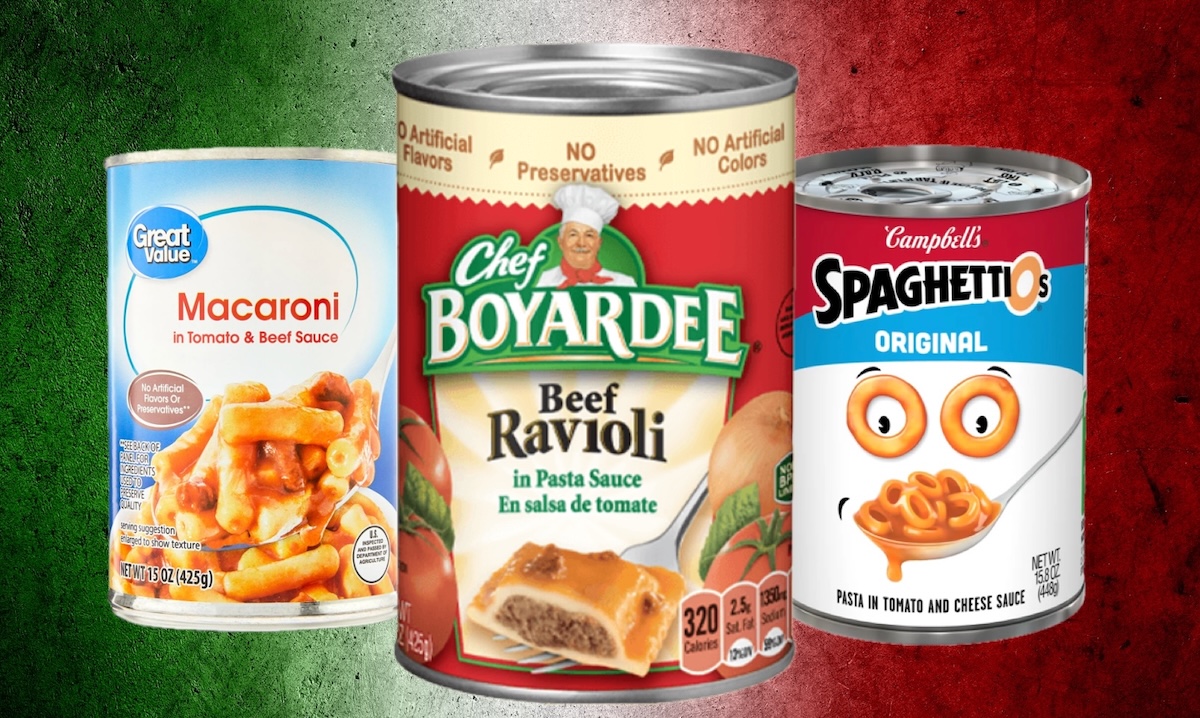
You can't beat the convenience of heating up a can of pasta. Whether you've had a long day at work or you just want something quick and easy, canned pasta does the trick. But it also wreaks havoc on your health. Many canned pastas are filled with worrisome ingredients, salt, sugar and saturated fat, which leads to health problems like heart disease and obesity.
Before putting a canned pasta in your cart, there's a few key things to look for on the back of the nutritional label.
Calories: Depending on age range and fitness goals, on average, the guidelines for calorie intake range between 1,600 to 2,000, per Cleveland Clinic.
Saturated fat: Saturated fat is something you'll often find in frozen food and canned goods. According to the American Heart Association, if you're following a 2,000-calorie-a-day diet, you should not have more than 13 grams of saturated fat. Too much can lead to serious health issues like high cholesterol and heart disease.
Sodium: Many canned pastas load up on the salt for flavor. While it might be tasty, you're risking your heart. The American Heart Association says too many Americans consume more salt than recommended. The organization suggests having no more than 2,300 milligrams a day, but many people have 3,500mg daily.
Sugar: According to the American Heart Association, women shouldn't have more than 6 teaspoons of sugar a day, which is around 100 calories, and for men, no more than 9 teaspoons or 150 calories per day.
To help guide you through the countless cans of pasta, Eat This, Not That! spoke with dietitians who share ones to avoid and why ranked in order of bad to worst.
Bon Italia Spaghetti & Meatballs
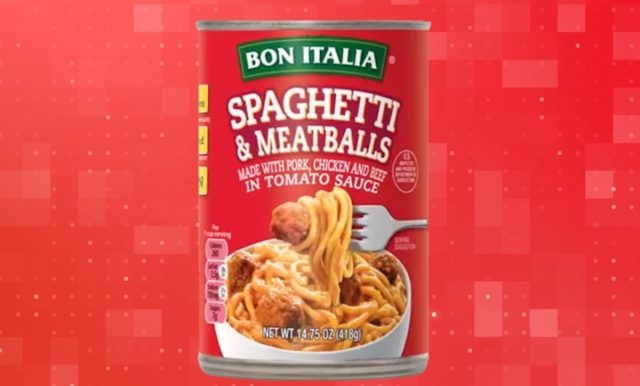
Calories: 240
Fat: 9g (Saturated fat: 3.5g)
Sodium: 620 mg
Carbs: 29g (Fiber: 4g , Sugar: 10g)
Protein: 10g
Bon Italia Pasta Rings and Meatballs makes our list as one of the unhealthiest canned pastas because of its high fat content and concerning ingredients.
"Bon Italia Spaghetti & Meatballs in Tomato Sauce may seem like a decent option with 10g of protein, but its ingredient list tells a different story," says Mary Sabat, MS, RDN, LD.
"The meatballs are made with non-organic beef and pork, often raised with hormones and antibiotics, and include textured soy protein—a highly processed filler linked to inflammation."
Another questionable ingredient the pasta contains is high fructose corn syrup, which is "a major red flag in any savory meal, as it contributes to blood sugar spikes and poor metabolic health," Sabat explains.
"The presence of flavorings and preservatives further points to a product built for shelf life, not nourishment. While the calorie count may be modest, this canned pasta is packed with additives, seed oils, and refined ingredients that detract from its nutritional value, making it a poor choice for anyone trying to eat clean or support long-term health."
Kroger's Spaghetti and Meatball
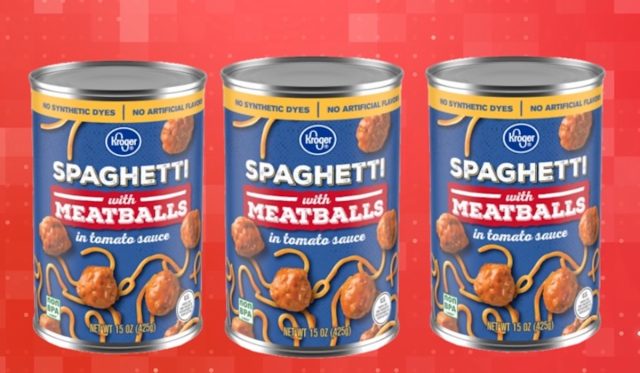
Calories: 250
Fat: 10g (Saturated fat: 3.5g)
Sodium: 750mg
Carbs:29 g (Fiber: 6g , Sugar: 7g)
Protein: 9g
Kroger Spaghetti and Meatballs is another unhealthy choice because of the junky ingredients and high sodium, fat and sugar.
According to Sabat, "Kroger's Spaghetti and Meatballs may seem like a convenient meal with 9g of protein and 6g of fiber, but a closer look at the ingredients reveals it's far from a clean or healthy option. The meatballs contain non-organic beef and pork, along with textured vegetable protein, soy protein concentrate, and soy protein isolate—highly processed soy derivatives often used as cheap fillers."
She explains, "The inclusion of high fructose corn syrup, caramel color, and natural flavorings raises red flags for added sugars and chemical additives. It also contains glyceryl monostearate (a synthetic emulsifier) and enzyme-modified cheese, another marker of ultra-processed food. With 750mg of sodium (over 30% of the daily value) and 7g of sugar, this meal may be low in calories but is high in additives, fillers, and inflammatory seed oils like soybean oil. Despite decent fiber, it's still a processed product that doesn't support clean eating or long-term health goals."
Chef Boyardee Jumbo Spaghetti and Meatballs
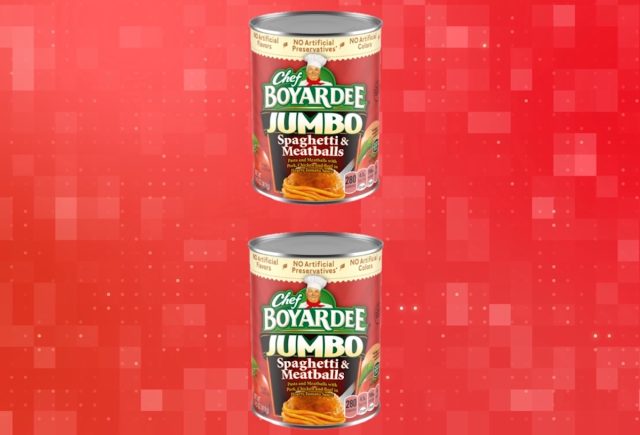
Calories: 280
Fat: 13g (Saturated fat: 4.5 g)
Sodium: 700mg
Carbs: 29g (Fiber: 3g , Sugar: 8g)
Protein: 11g
Chef Boyardee Jumbo Spaghetti and Meatballs might be popular among kids, but they're health could pay for eating the popular canned pasta later on.
"While you may see claims on the label that it has 'no artificial flavors', 'no artificial preservatives', and "no artificial colors", don't automatically assume that this is a healthy product.," says Michelle Rauch MSc RDN Registered Dietitian/Nutritionist for The Actors Fund.
She explains, "For a one cup serving, Chef Boyardee Jumbo Spaghetti and Meatballs contains 700 mg of sodium. If you review the ingredients list, in addition to plain salt, you will find other sources including, but not limited to garlic salt, sea salt, and Romano cheese which all contribute to that number. One serving contains 29% of the daily sodium recommendation for those in the general population or almost half (46%) for those with a history of cardiovascular or kidney disease."
Rauch adds, This product contains 8g of Sugar which is likely from the high fructose corn syrup and caramel color listed in the ingredients. Consumption of foods containing High Fructose Corn Syrup along with other sugars is associated with weight gain, obesity, insulin resistance, along with other adverse health outcomes."
"The American Heart Association recommends limiting total added sugars (which includes High Fructose Corn Syrup) to no more than 6% of your daily calorie intake," she continues. "Guidelines are different between men and women. Women are encouraged to keep under 25g and men should stay below 36g of added sugars."
Campbell's SpaghettiOs
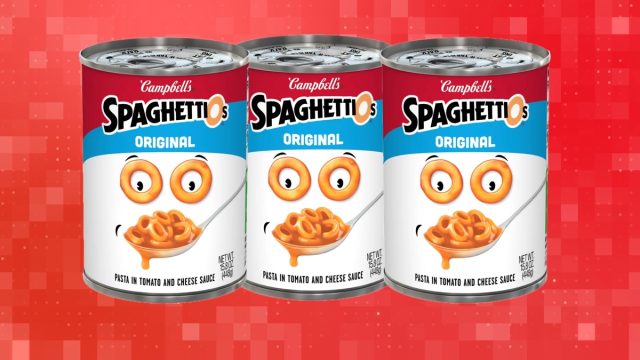
Calories: 170
Fat: 2g (Saturated fat: .5g0
Sodium: 600mg
Carbs: 33g (Fiber: 3g , Sugar:12 g)
Protein: 5g
Campbell's Spaghettios has a catchy jingle that is memorable, but Sabat warns to avoid this canned pasta.
"Campbell's SpaghettiOs may look like a fun, kid-friendly meal, but they're far from a healthy choice," she says.
"With 33 grams of carbohydrates and 12 grams of added sugar per serving, it's more dessert than dinner. The first few ingredients include high fructose corn syrup, which is strongly linked to metabolic issues like insulin resistance and obesity."
She adds, "Beyond that, it contains refined enriched pasta (stripped of fiber and nutrients), seed oils like corn, canola, and soybean oil (all inflammatory), and enzyme-modified cheeses and butter, which are heavily processed. The vague "natural flavoring" also raises red flags, as it often hides a cocktail of chemical additives. Combined with low protein (just 6g) and almost no fiber, this canned pasta is a highly processed, sugar-laden product that fails to support lasting energy, satiety, or nutrition."
Chef Boyardee Beef Ravioli
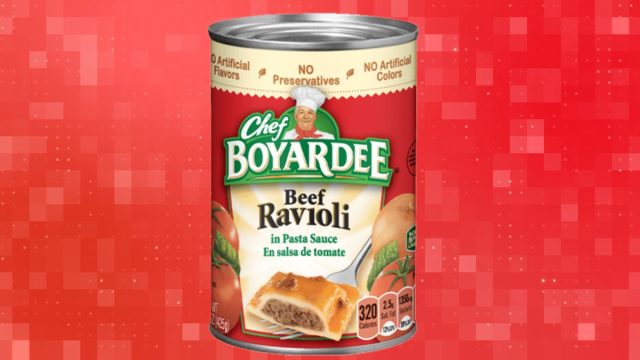
Calories: 180
Fat: 4.5g (Saturated fat: 1.5g)
Sodium: 780mg
Carbs: 30g (Fiber: 1g , Sugar:3 g)
Protein: 5g
Another Chef Boyardee canned pasta to skip is the infamous Beef Ravioli.
According to Sabat, the "Chef Boyardee Beef Ravioli is one of the unhealthiest canned pastas on the shelf due to its highly processed ingredients and lack of real, whole-food nutrition."
She says, "It contains GMO and non-organic beef, high fructose corn syrup, and soy protein concentrate—all of which are associated with inflammation, poor metabolic health, and reduced nutritional quality."
But there's even more problematic ingredients, per Sabat.
"The inclusion of soybean oil, a processed seed oil, contributes to unhealthy fats that can disrupt the body's natural balance." She explains, "Add to that a long list of additives like modified corn starch, caramel color, chemical preservatives, and vague "flavorings," and you're left with a product that may fill you up but offers little in the way of clean, nourishing fuel."
Sabat adds, "With only 1 gram of fiber and 5 grams of protein, this meal lacks nutrition to make you feel satisfied. This canned pasta is far from a wholesome meal—it's a cocktail of ultra-processed ingredients that are best avoided for those aiming to support long-term health."
Great Value Macaroni & Beef
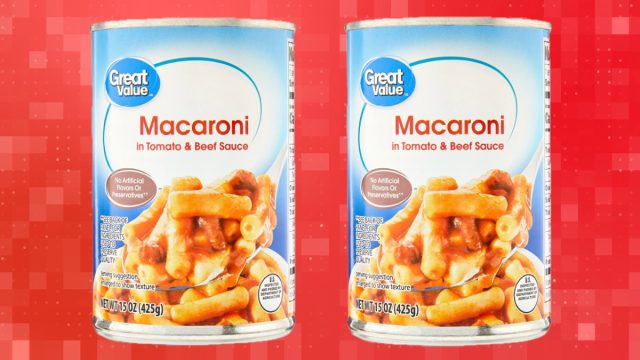
Calories: 330 calories
Fat: 11g (Saturated fat: 4g)
Sodium: 1,230 mg
Carbs: 47 g (Fiber: 3 g , Sugar: 11 g)
Protein: 11 g
Great Value Macaroni & Beef is anything but great for your health and Violeta Morris, MS, RDN from Columbus, OH, The Concierge Dietitian, @conciergedietitianvioleta recommends leaving it at the grocery store.
"For just $0.98, you're getting 330 calories, 11 grams of fat, 1,230 mg of sodium, 47 grams of carbohydrates, and 11 grams of protein—and you might as well add health concerns to the price tag," she says.
"As a dietitian, I believe in moderation, but consuming products like this regularly can be concerning," she emphasizes. "This can alone contains more than half of the recommended daily sodium intake and 47 grams of carbohydrates, primarily from tomato purée, enriched macaroni, high fructose corn syrup, and modified food starch. This is not a balanced meal, as it is overloaded with carbohydrates and low in protein, making it a less-than-ideal choice for overall health."
Chef Boyardee Beef Lasagna
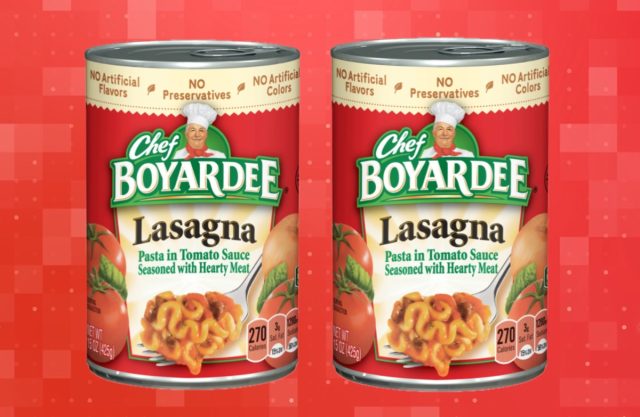
Calories: 330 calories
Fat: 9g (Saturated fat: 3.5g)
Sodium: 1,320 mg
Carbs: 54 g (Fiber: 4 g , Sugar: 16 g)
Protein: 9 g
Chef Boyardee Beef Lasagna is a quick meal that's full of salt, sugar and fat, which when consumed often can lead to health issues. Think twice before putting this into your cart.
"As a dietitian, it frustrates me that companies like Chef Boyardee can market their products with claims like '90 seconds, dinner is ready to serve' and 'Pasta in Tomato Sauce Seasoned with Hearty Meat,' making it seem like a balanced meal," says Morris.
"In reality, a can of Chef Boyardee Beef Lasagna contains 330 calories, 9 grams of fat, 1,320 mg of sodium, 54 grams of carbohydrates, and just 9 grams of protein," she points out.
Morris adds, "This product is highly processed, loaded with excess sodium, refined carbohydrates, numerous additives, and preservatives, while offering very little protein. I encourage most of my patients to aim for 30 grams of protein per meal, yet this product provides only 30% of that goal, making it far from a nutritious option."
Chef Boyardee Mac And Cheese
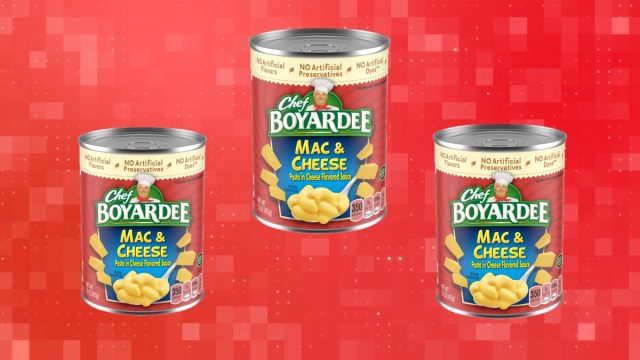
Calories: 410 calories
Fat: 17 g (Saturated fat: 7g)
Sodium: 1,320 mg
Carbs: 51 g (Fiber: 3 g , Sugar: 0 g)
Protein: 13 g
Chef Boyardee Mac & Cheese is a canned pasta that should never come home with you. Read the label and ingredient list and you'll see what.
"This can is packed with empty calories, meaning it lacks essential vitamins, fiber, and minerals needed for a balanced meal," says Morris. "The American Heart Association recommends a daily sodium limit of 1,500 mg, and just one can of this mac and cheese contains 88% of that amount, which can negatively impact blood pressure and heart health."
Morris explains, "Additionally, it's loaded with refined carbohydrates, artificial additives, and a total of 27 ingredients, many of which provide little nutritional value. Before adding it to your cart, consider whether it's truly nourishing your body."
Campbell's Chunky Chili Mac
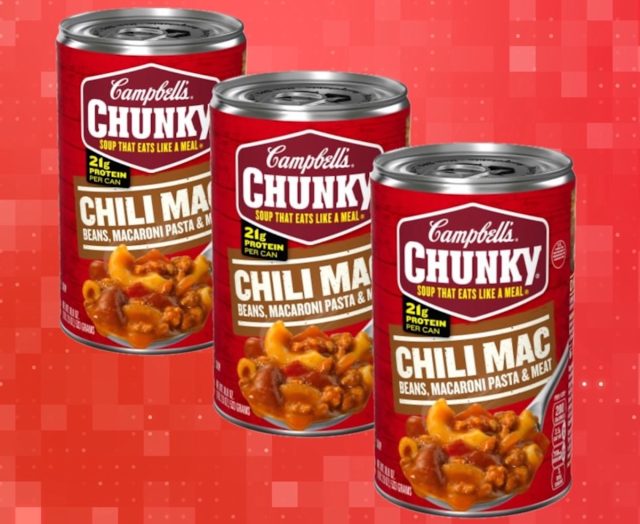
Calories: 440
Fat: 15g (Saturated fat: 5g)
Sodium: 1,720mg
Carbs: 56g (Fiber: 9g , Sugar: 15g)
Protein: 21g
The worst canned pasta you can eat is Campbell's Chunky Chili Mac.
"While Campbell's Chunky Chili Mac provides a solid amount of protein (21g) and fiber (9g), it's far from a healthy option," says Sabat.
She explains, "With a whopping 15 grams of sugar and an alarming 1,720 milligrams of sodium per serving, it can contribute to blood sugar spikes and strain cardiovascular health."
Sabat points out the ingredients are a problem in addition to the high level salt.
"The meat used is non-organic, and the inclusion of pork—a protein that should always be organic due to its higher toxin load—raises additional concerns."
She explains, "It also contains maltodextrin, a highly processed filler known to rapidly spike blood sugar, along with modified cornstarch, vegetable oils, flavorings, and caramel color. These ultra-processed additives offer little to no nutritional value and may contribute to inflammation and poor gut health. Despite its protein and fiber, this canned meal is overloaded with sugar, salt, and chemical fillers, making it a poor choice for anyone prioritizing real, clean nutrition."









